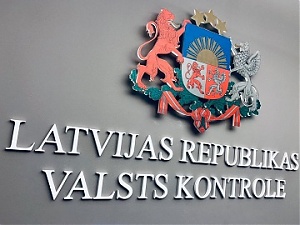Covid-19, Latvia, Legislation, Medicine
International Internet Magazine. Baltic States news & analytics
Tuesday, 07.05.2024, 14:59
Latvia: State Audit office turns to State Police in relation to procurement of protective equipment
BC, Riga, 20.07.2020. Print version
Print version
 Print version
Print versionThe State Audit Office has turned to the police in relation to the procurement of protective equipment performed by the National Health Service, LETA learned from the audit office.
 |
|---|
The State Audit Office assessed the procurement process of personal protective equipment - masks and respirators - in the health care sector in the time period from early March until early April when the procurements were taken over by the defense sector.
The auditors discovered that in the process of delivering personal protective equipment in the health sector, decisions in several cases were made unilaterally, there has been a lack of transparency while explaining supplier evaluation criteria, and this raises suspicions of a possible risk of corruption.
The auditor said that the first case of Covid-19 in Latvia was diagnosed on March 2. The Cabinet of Ministers allocated financial resources of EUR 1.2 million euros to the Ministry of Health one day later to enable the Emergency Medical Service to purchase medical equipment, disposable personal protective equipment, medicines and disposables, and to cover other emergency expenses for epidemiological safety. Part of the funding allocated was also earmarked for the replenishment of the state material reserves.
The Emergency Medical Service and the National Health Service had to make purchases of personal protective equipment in a situation where one had not defined the procuring requirements either at the national level or within the health sector. The way for preferential purchasing fell within the competence and responsibility of the official making the procurement.
The audit established that the procurement process in the health sector was based on verbal instructions. Moreover, the health sector had no previous experience in purchasing under comparable conditions, and the employees in charge of purchases acted in accordance with their
understanding of the application of public procurement law to effective procurement due to the conditions caused by the state of emergency.
Although the National Health Service indicated that a working group dealing with the purchasing of personal protective equipment had been established by oral order of the Director of the Service, the auditors were unable to obtain any documentation on its activities.
According to the auditors, the fact that the National Health Service did not publish the list of all tenders caused significant discussions about the tenderer selection process. The Service has published information on offers from 65 suppliers by indicating that the Service would supplement the list. Thus, sector could not follow up and monitor the supply process, that would reduce corruption risks.
Other articles:
- 28.01.2022 BONO aims at a billion!
- 25.01.2021 Как банкиры 90-х делили «золотую милю» в Юрмале
- 30.12.2020 Накануне 25-летия Балтийский курс/The Baltic Course уходит с рынка деловых СМИ
- 30.12.2020 On the verge of its 25th anniversary, The Baltic Course leaves business media market
- 30.12.2020 Business Education Plus предлагает анонсы бизнес-обучений в январе-феврале 2021 года
- 30.12.2020 Hotels showing strong interest in providing self-isolation service
- 30.12.2020 EU to buy additional 100 mln doses of coronavirus vaccine
- 30.12.2020 ЕС закупит 100 млн. дополнительных доз вакцины Biontech и Pfizer
- 29.12.2020 В Rietumu и в этот раз создали особые праздничные открытки и календари 2021
- 29.12.2020 Latvia to impose curfew, state of emergency to be extended until February 7








 «The Baltic Course» Is Sold and Stays in Business!
«The Baltic Course» Is Sold and Stays in Business!

